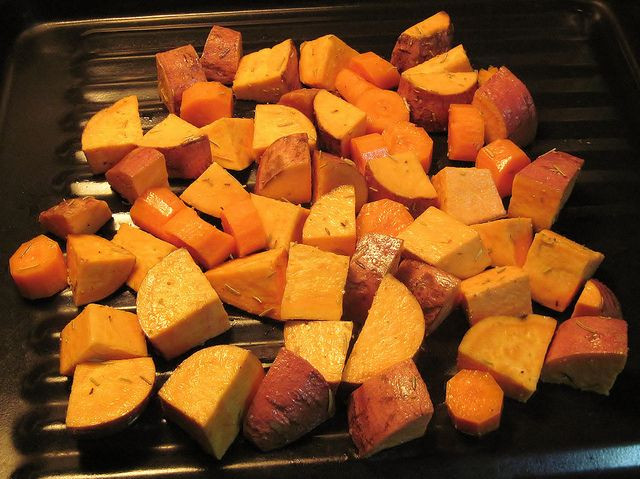3 Breast Cancer-Fighting Foods: Cartenoids, Isoflavones Linked To Increased Survival

Did you know that the right diet can reduce your risk of developing breast cancer? Numerous studies indicate that certain grains, fish, and legumes are associated with lower rates of breast cancer incidence and mortality. For breast cancer survivors, conscientious eating may also help prevent recurrence of the disease.
Although most studies fall short of establishing a causal link between nutrition and resistance, many specialists argue that the overall statistics speak for themselves. "We have to take a global look at survivorship," said Alison Estabrook, chief of breast surgery at St. Luke’s-Roosevelt Hospital, where female patients are currently being invited to attend a seminar on the protective capacity of certain superfoods. “It's clear better eating habits increase the possibility that a woman won't get breast cancer or have a recurrence."
The following three foods have been singled out by researchers for their apparent influence on health factors associated with breast cancer mortality and incidence. Isoflavones, carotenoids, and omega-3 fatty acids are among the nutrients believed to assist women in their fight against the disease that kills upwards of 39,000 Americans each year.
Soybeans
"It was feared that components of soy had estrogen-like properties that influenced the growth of breast cancer cells," Barry Boyd of the Greenwich Hospital-Yale Health Systems said, speaking to CNN. "Science has not only proved an absence of risk, there's also a possible benefit.”
Boyd is right: last year, at least two peer-reviewed studies found a link between the consumption of soybeans and a statistically significant reduced breast cancer mortality and recurrence. Published in the American Journal of Clinical Nutrition and the Asian Pacific Journal of Cancer Prevention, the research efforts illuminated the protective capacity of isoflavones –– an organic compound occurring in soybeans, chickpeas, peanuts.
Squash, Kale, And Sweet Potatoes
These foods derive their preventive qualities from carotenoids –– the natural pigment found in orange foods like carrots, squash, and sweet potatoes as well as dark greens like kale and spinach. In a 2009 study published in the journal Cancer Epidemiology, the substance was linked to a “greater likelihood of breast cancer-free survival.” According to Mitchell Gaynor of Gaynor Integrative Oncology, women who want to up their carotenoid intake should increase their overall consumption of cruciferous vegetables like broccoli, cabbage, and cauliflower as well.
Salmon, Haddock and Cod
These fish contain significant quantities of omega-3 fatty acids –– a substance tied to numerous health benefits by previous research. In a 2011 study published in the Journal of Nutrition, experts found that the consumption of these acids inhibited the proliferation of cancerous cells as well as the progression of tumors. In addition, a diet high in omega-3 was associated with a 25 percent reduced risk of breast cancer recurrence.
Sources:
Sarah J Nechuta, Bette J Caan, Wendy Y Chen, Wei Lu, Zhi Chen, Marilyn L Kwan,Shirley W Flatt, Ying Zheng, Wei Zheng, John P Pierce, and Xiao Ou Shu. Soy food intake after diagnosis of breast cancer and survival: an in-depth analysis of combined evidence from cohort studies of US and Chinese women. Am J Clin Nutr. 2012.
Rock CL, Natarajan L, Pu M, Thomson CA, Flatt SW, Caan BJ, Gold EB, Al-Delaimy WK, Newman VA, Hajek RA, Stefanick ML, Pierce JP; Women's Healthy Eating and Living Study Group. Longitudinal biological exposure to carotenoids is associated with breast cancer-free survival in the Women's Healthy Eating and Living Study. Cancer Epidemiol Biomarkers Prev. 2009.
Post-diagnosis soy food intake and breast cancer survival: a meta-analysis of cohort studies. Chi F, Wu R, Zeng YC, Xing R, Liu Y, Xu ZG. Asian Pac J Cancer Prev. 2013.
Marine Fatty Acid Intake Is Associated with Breast Cancer Prognosis. Ruth E. Patterson, Shirley W. Flatt, Vicky A. Newman, Loki Natarajan, Cheryl L. Rock, Cynthia A. Thomson, Bette J. Caan, Barbara A. Parker, and John P. Pierce J. Nutr. 2011.



























